The Enlightenment of Sarada Uchiha
Sarada's MS as a step toward enlightenment.
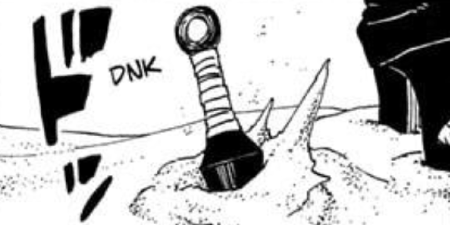
Sarada Uchiha has been a puzzle for readers of Boruto: Two Blue Vortex (TBV) since the first chapter post-time skip. The girl who invokes her goal of being Hokage whenever she asserts her will—a vocal symbol akin to Boruto putting Sasuke's marred headband whenever he asserts his will—being decidedly... not Hokage-like.
Given her idolization of Naruto, it would be reasonable to assum she should have spent the past three years living her life by the principle of WWND? (What Would Naruto Do?). And while she's been dogged in advocating for Boruto, her teammate-turned-into-the-world's-most-wanted-shinobi, she's been consistently asking others to act in line with her feelings rather than acting herself. Just as Naruto never turned his back on Sasuke, Sarada refuses to turn her back on Boruto's plight, but what Sarada lacks is Naruto's action and the underlying ethos of making finding friends through acknowledging the suffering of others.
To Sarada's credit, we must recognize that empathizing with those around her (as Boruto does with Mitsuki in his post-fight bro self actualization seminar) isn't easy under Omnipotence. The suffering Sarada is experiencing stems in large part from the injustice of Boruto's current predicament, a series of misfortunes stacking themselves up on him, never cutting him a break: losing his body, losing control of his mind, losing his physical life, losing his place in the memories of those who loved him. However, while Boruto himself has accepted this turn of events, focusing on the walking-talking-planet-destroying-tree problem instead, Sarada wants to restore Boruto's place in the world and return him to the village.
This is not an ignoble goal, but it's one that is impossible to achieve through simply talking about Boruto himself, for how can you convince others to follow you when the way you conceptualize your suffering is in opposition to their suffering? To return again to the Boruto and Mitsuki I believe you're perfectly capable of shining on your own talk, worthy of a thousand yaoi interpretations, what Boruto is really doing is sharing the same affirmation he gave himself in chapter 80 with his friend, extending what he learned through his own suffering, through his own endurance. After all, a shinobi is one who endures.
When we look at Sarada throughout the story of TBV, we see Sarada having an opposite reaction to the feelings of others, demonstrated most poignantly by the Sarada/Sumire conflict. The girls have been in allyship for the past three years, the only two people in the village—aside from Daemon and Eida—who know the truth of Omnipotence and Boruto's Uzumaki identity. However, Sarada doesn't acknowledge her friend's emotions when she rushes forward to hug Boruto and doesn't reflect on the suffering Sumire has been going through as well, either through Boruto's long absence or Sarada's actions when he (briefly) returns to the village. It's also Sumire who points out that Sarada doesn't "reflect on his pain" when it comes to Boruto's own suffering. In fact, throughout the plot, Sarada's emotions and reactions to events beyond Boruto seem blunted, her mind laser focused on the goal of bringing him back to the village, that Boruto himself doesn't hold.
We receive the first glimmers of the why behind Sarada's behavior in chapter 20, hinting at a path forward for our future Hokage. But first, we need to talk a little more about the themes and symbolism in TBV.
Dharma Wheel, Spin, Spin, Spin
Beware: In this section, a white woman with access to the internet talks about religions that are not hers. Feel free to ridicule and lambaste erroneous assumptions, where appropriate.
It's been well-established that the doujutsu Kawaki inherited from his Otsutsuki DNA, the Kokugan (literally: Black Eye) shares the appearance of a Dharma Wheel from Buddhist imagery. The sunburst pattern in in Sarada's MS is literally the reverse of Kawaki's eye, the points of the rays within her iris pointing outward rather than inward. The wheel itself represents both the teachings of Buddha and the path to enlightenment. Each of the eight spokes is representative of the Noble Eightfold Path: Right view, right resolve, right speech, right action, right livelihood, right effort, right mindfulness, and right concentration. If Kawaki himself is a manifestation of the wheel, a symbol for others rather than reflecting himself, we can see how Boruto in TBV seem to already be on this path.
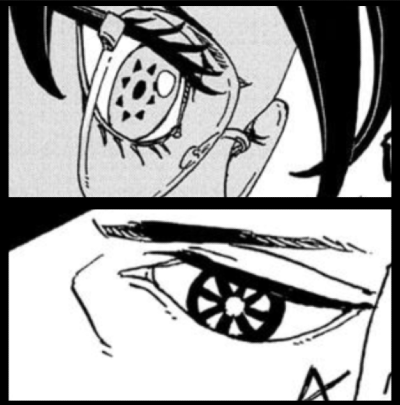


However, there's another aspect to the Dharma Wheel that precise the Noble Eightfold Path: the Four Noble Truths, which can be summarized as: life is suffering; suffering is caused by desire and ignorance; there is a path by which suffering can be overcome; following the Eightfold Path can lead to an end of suffering.
The hub of the wheel (the inside) represents discipline along this path while the rim (the outside, which Sarada's MS pattern lacks) represents birth, death, rebirth, and liberation. If we think of Sarada's pattern as the inverse of Kawaki's, she's not bound by the cycle of reincarnation due to the actions of Naruto and her father.
We're going to explore what happens to Sarada in chapter 20 of TBV through the lens of the Four Noble Truths, but first, we're going to take a detour into Uchiha clan lore.
Absence of Hate: Suppression and Suffering
If we're feeling frustrated with the slow unfolding of backstory to describe Sarada's mental state, it's helpful to remember that it took until chapter 619 of Naruto for Tobirama to do a lore drop explaining the history of the Uchiha clan, both their emotional state and doujutsu.



According to the Second Hokage, members of the Uchiha clan experience love so deeply that they suppress it. When an Uchiha knows love and loses it, their Sharingan emerges, an ability that is tied to their heart and, ultimately, their hatred. However, hatred isn't a natural feature of the Uchiha clan. Rather, it stemmed from a kind of original sin of the shinobi world, complete with Black Zetsu playing the part of the serpent in the Garden of Eden, tempting Asura, the ur-Uchiha, to wage war against his brothers when their father, the Sage of Six Paths, chose Indra to lead their clan.
What's important for readers of Boruto to remember is that Sasuke and Naruto ended this Curse of Hatred, but this didn't fundamentally changed Sarada's experience as an Uchiha. She still experiences deep love, she still suppresses it, and she still turns inward, toward her own emotions and desires, when she experiences the pain of losing love. Even without hatred, she's still an Uchiha, and she's still suffering.
The Enlightenment of Sarada Uchiha
Let's return to the Four Noble Truths and Sarada's MS. The first Noble Truth is life is suffering. The first manifestation of her Mangekyo Sharingan occurs when the weight of Omnipotence is crushing her. Sarada falls to her knees, thinking of all the tragedy that has befallen Boruto, tears streaming from her eyes. Through the pain of these emotions, her MS awakens as she begs her father to help Boruto, classifying the request itself as selfish, something she's asking him to do for her. When Sasuke acts upon her request, it's not because he was moved by the weight of her words, but by the visible manifestation of her suffering, manifested in her eyes.
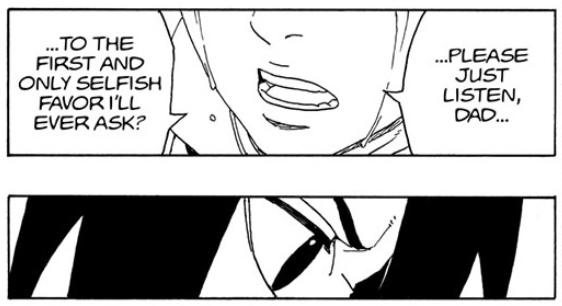
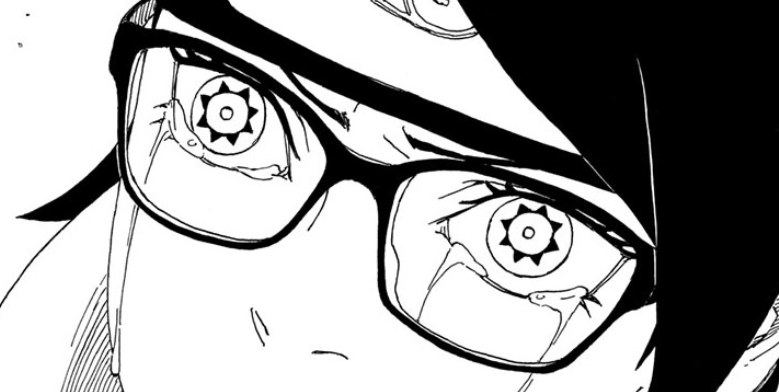
Sarada's First Noble Truth: life is suffering.
As we begin TBV, Sarada is stuck in an emotional paradox. Saving Boruto is the right thing to do, the thing her idol, Naruto, did for her father. However, she fails to separate her own suffering from her advocacy for Boruto, in part due to the nature of her clan, one that suppresses the feeling of love as a self-protective mechanism against its power.
Sarada's actions revolve around Boruto to the exclusion of others, including Sumire, who has been her one confidant over the past three years. But, in the aftermath of running to Boruto and hugging him, Sarada finds herself thinking, I didn't mean to throw myself at him like that. What should I do? There are so many things I wanna ask, but I don't know how to start things off now. Similarly, after Sumire confronts Sarada about not thinking about Boruto's feelings or Sumire's own, she doesn't know how to react, caught off guard by how the people around her perceive her own actions.
As the mission to the Sand begins, we see Sarada reflecting on that confrontation, memories of Sumire's words coming back to her. She appears distracted, distant, and plagued by what her friend said, as though she doesn't quite understand what happened. Even as she promises to focus on the mission, her body language is tense and unnatural, as though her physical form is restricted by the disorder of her mind. It's as though someone grabbed the volume knob on the dissray she's been experiencing since the first chapter of TBV and cranked it up to 11.
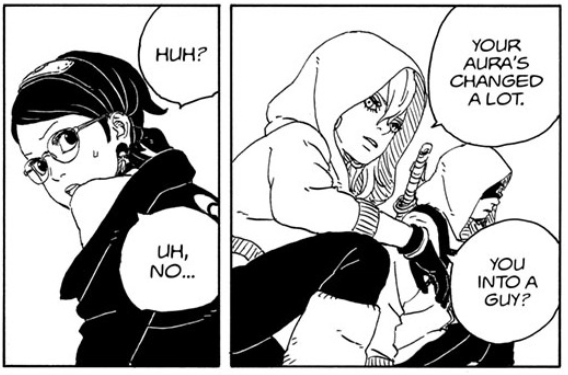
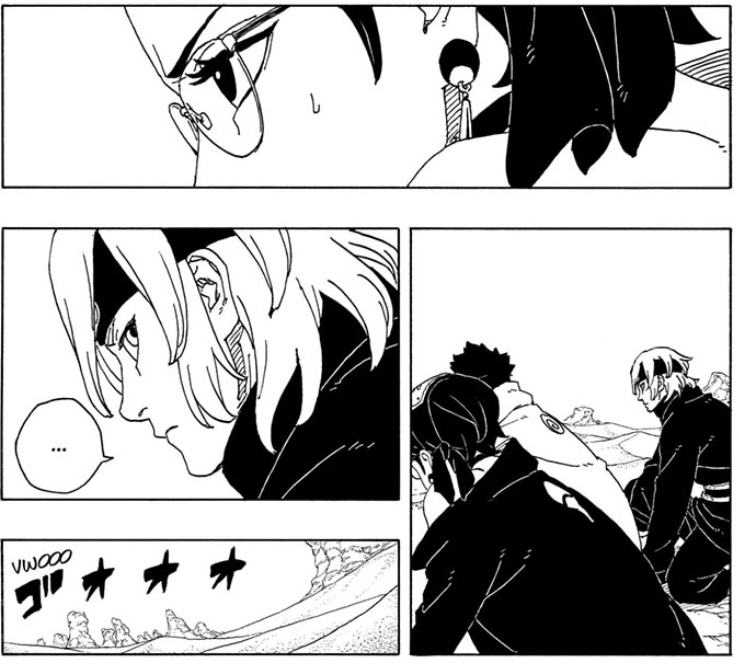
Distracted Sarada is distracted.
From the moment Yodo encounters Sarada, she senses that something is off with her, that there's a disconnect between this Sarada and the girl she met during the Chunin exams so many years ago, saying, "your aura's changed a lot." Simply put, Sarada is not herself.
It's only in the quiet after getting impaled by Ryu's iron sand that a dying Yodo's superior sensitivity can detect what's going on inside Sarada, noting that she's in a state of conflict and misunderstanding herself, which, if we recall the Four Noble Truths, is the cause of suffering. During this conversation, even Ryu himself notes that Sarada seems "to be in pain" despite the fact that she wasn't physically injured during the battle. She's in emotional pain.
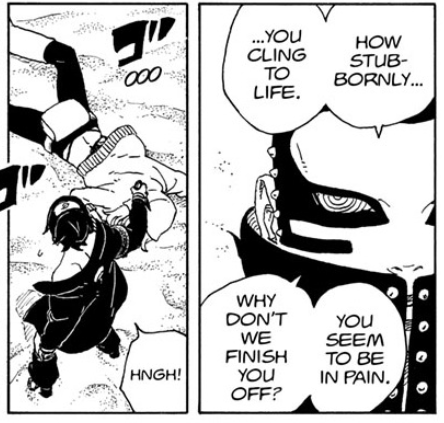
While it seems as though Yodo is talking about Sarada refusing to use her power and feeling conflicted over using her MS for Boruto, this is actually a conversation about Sarada's suffering, the pain she experienced over losing Boruto that led to her MS awakening, the internal conflict she's been experiencing since then while suppressing her feelings—subconsciously deluding herself.
What's different between this moment and the other times when Sarada has been confronted about her feelings for Boruto—by Sumire during the Ao arc, by Mitsuki after Boruto's death, by Eida during their girl talk—is that the conversation isn't focusing on Boruto at all. It's about Sarada, what she's feeling, how she's reacting, and how it's holding her back.

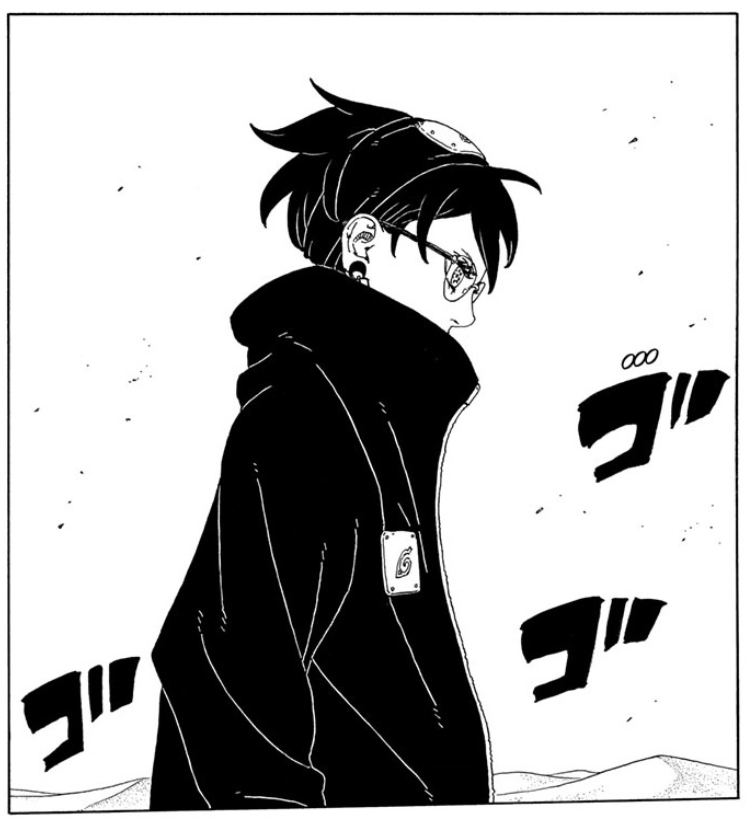
Sarada's Second Noble Truth: misunderstanding and desire leads to suffering.
When she is able to recognize why she's suffering, we see her entire demeanor shift to a different Sarada than we've seen for all of TBV. There's a moment of ecstasy, of peace, of release when she drops her kunai, the weapon she used so many times to defend Boruto without actually being able to protect him. The realization literally frees Sarada (and Mitsuki and Araya).
In place of the sweating, distracted, confused Sarada we've been experiencing since they came to the sand, in place of the frantic, desperate Sarada who spent the first arc of Boruto advocating for Boruto by barging into rooms and pleading with Eida, we see a shinobi who is entirely locked in. Her posture has changed, her expression has changed, she's now in control of her actions and her doujutsu, and Shinki's iron sand as well. Now that she accepts her suffering and accepts why she's suffering, Sarada is free.
Achieving Enlightenment
Some speculation on future plot events. No guarantee of accuracy.
This is the starting point of Sarada's development in TBV, not its end point. In understanding that her actions have been motivated by her own suffering, Sarada's worldview will shift, causing her to see the plight of others differently: Boruto, Sumire, Sasuke, and even perhaps Kawaki and others. She's going to be more aware of the world around her, the goals she's pursuing, and their possible outcomes.
Overcoming suffering doesn't mean she's going to abandon her goal of saving Boruto, but it's going to change her methodology to achieve her aims to be less focused on easing her on pain, her vision to widening beyond Boruto, but still including him. As she recognizes her own suffering, she'll be open to understanding, and trying to alleviate, the suffering of others.
